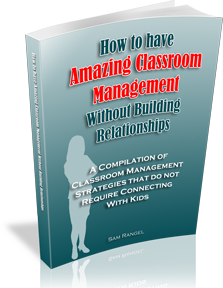
Here is the sixth Nail in the Nail the Teacher Interview Series.
Have a Classroom Management Plan.
There will most definitely be a question about your classroom management strategy.
The members on the interview panel want to know if you know if you’re going to be able to keep the class on task. You can’t teach if you can’t manage the class.
There is not a one-size-fits-all classroom management plan. You’ll have to tweak your plan often before you get it working for your group of students, but here are some general points that you should include when describing your classroom management plan.
- Focus on creating lesson plans that keep the students engaged. An engaged student is not a behavior problem. Let the panel know that this is a high priority for you. Review Nail #3 Creative Lesson Planning.
- Make building positive relationships a priority. Students will not misbehave if they have a positive connection with the teacher. Nail #1 will help with this.
- Have clear procedures in the classroom. Students need structure. They want to know what to do when they come into the classroom, how to ask to use the restroom, where to turn in their homework, etc. Re-teach the procedures often the first month until it becomes second nature to the students.
- Only one rule: Respect. You don’t need a poster full of rules. Teach the students that it’s all about respect. If they talk when they should be listening to the teacher, they’re not showing respect to the teacher or to the other students who are trying to listen. If they use inappropriate language in class, they’re not showing respect to themselves, their parents, other students, etc. Make respect an ongoing lesson in the classroom, and you won’t need to spend time on creating a list of class rules. I would be impressed had I heard this from a candidate in an interview. Here’s a series of posts I wrote about it.
- Have a clear consequence system. Should the student need a consequence, make sure that the process is clear and consistent. For example: For the first offense, the student gets a warning. The second time, it’s a one-on-one conversation after class. The third time, it’s a call home or a detention etc. The most important point to remember is that you will do everything in your power to handle the situation internally. That is, you won’t be sending students to the office unless all other options have been exhausted.
- Make parent contact a key part of your classroom management plan. If a student is not being respectful, and your warnings aren’t getting through, let the interview panel know that your next step is to call the parent. Although email is convenient, you want to let the panel know that you value the personal touch of the phone call.
- Respect goes both ways. You need to convince the panel that you understand that the students in your class are just kids, and that as frustrating as one of them can be, you will always show them respect when having to educate them regarding their behavior. You are not there to punish, you are there to educate. Sometimes education requires a consequence, but it is never punitive. You will score a lot of points if you mention in your responses that you never yell or humiliate students – EVER. There will be times when you’ll want to tell a student, “You’re acting like a preschooler.” You’ll want to raise your voice to tell the class to be quiet, but if you do, you lose. If I felt that by your responses you would be one of those yelling teachers, I would cross your name off my list. Respect goes both ways.
- Be open to learn from other teachers. Every teacher has a different classroom management system. Some have been created through trial and error over years and work almost perfectly. Let the panel know that you aren’t trying to reinvent the wheel, and are open to learning from veteran teachers. This willingness to learn in a candidate is always refreshing.
- Redemption is powerful. I don’t think I’ve ever heard a candidate mention redemption, but I know when I do, I will put a star and a happy face next to his/her name on my list. I’ve learned that when students are forgiven for a mistake they’ve made in class, they learn more about making right choices than any consequence can teach. If yesterday, Johnny disrupted the class and received a phone call home, he will behave better today. If today, I call home and let mom know that Johnny had a great day, Johnny will behave better for the rest of the year. Does this work every time? No, but by demonstrating to a student that yesterday’s mistake is forgotten or redeemed by today’s behavior, you go a long way in changing his behavior in your class. Students need to know that they can fix their mistake in your class. Mention redemption in your interview. Go ahead, I dare you.
The bottom line when sharing your classroom management strategy is to let the panel see that you believe in kids – all kids. You want them to see that you are not out to hammer the bad students and keep a “tight ship.” You want to create structure, but not an environment of fear. Kids will make mistakes, and they will need to be educated so they don’t make the mistakes again. You are there to educate, and if the panel sees that you view student mistakes as opportunities to educate instead of moments to assert your authority, you will impress them.
There you have it, the sixth Nail in the Nailing the Teacher Interview series – Have a Classroom Management Strategy.
I hope you’re finding these posts helpful. If so, please share them on Twitter or on Facebook. That would be cool.
Follow me on Twitter or like my Facebook page, so you get notified when I upload Nail #7.
Until next time, here’s to your Success in the Classroom!
Thank you,
Sam



